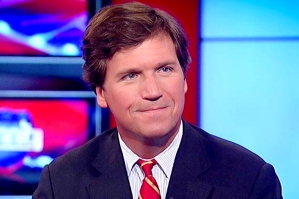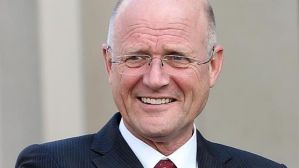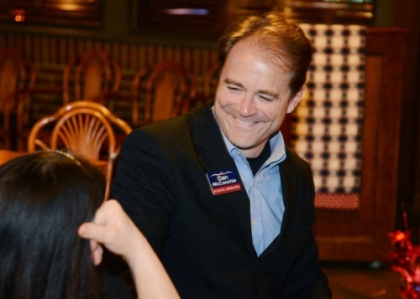The six panel discussions I was able to attend were held back-to-back with six other panel discussions taking place simultaneously in a nearby hotel ballroom.
Joseph Bast is president and CEO of The Heartland Institute, headquartered at 3939 North Wilke Road, Arlington Heights, IL 60004.
Early on I decided to write about an afternoon panel discussion held on the first day of ICCC-12. Not only did the title of the panel intrigue me, Fossil Fuels and World Peace, but all three of the speakers spoke with authority and clarity on the subjects provided, which as a whole provided an understanding of how fossil fuels foster world peace.
PANEL 3B – FOSSIL FUELS AND WORLD PEACE
Panel moderator:
lsaac Orr, research fellow on energy and environmental issues at the Heartland Institute.
Panel 3B Speakers in order of presentation:
- Craig D. Idso, Ph.D., founder and former president of the Center for the Study of Carbon Dioxide and Global Change and currently serves as chairman of its board of directors. He is the lead author of the Climate Change Reconsidered series produce by the Nongovernmental International Panel on Climate change. Check our Dr. Idso’s excellent blog and subscribe for free.
- Dennis T. Avery, a senior fellow of the Hudson Institute since 1989. Prior to that, he was a senior analyst in the U.S. Department of State (1980-88), where he won the National Intelligence Medal of Achievement in 19883. Avery is co-author, with Fred Singer, of the New York Times bestseller, Unstoppable Global Warming — Every 1,500 years, published in 2007. Dennis Avery’s forthcoming book is titled, When Weather IS Extreme: the “Little Ice Ages.
- Aaron Stover, a senior staff member and policy analyst for The Heartland Institute. He previously worked on transatlantic policy projects focused on Central and Eastern Europe for the Atlantic Council, the Center for European Policy Analysis, and the U.S.-EU-Slovakia Action Commission at the Center for Strategic and International Studies.
Craig D. Idso, Ph.D. – Historical Relationship Between Carbon Dioxide, Climate and Social Conflict
For his presentation, Craig Idso was asked to highlight the historical relationship between carbon dioxide, climate and social conflict.
As an introduction to his remarks, Idso noted that many political and opinion leaders feel it is important to enact legislation to limit carbon dioxide emissions out of concern that global warming is detrimental to society. Craig Idso then proceeded to set forth the historical relationship between carbon dioxide, climate and social conflict.
China was used by Idso as a good test case to begin highlighting the relationship between global warming and social stability. Why? Because it has been a well-populated, primarily agricultural country for millennia, and it has a relatively well-recorded history over this period. A 2013 study by Lee and Zhang (2013) indicated how natural calamities and human catastrophes peaked during the colder climates of the 17th and 19th centuries, whereas during the relatively warm 18th century, agriculture production was enhanced, famines were abated, wars, rebellions and epidemics were minimal and population growth surged.
A 2005 Zhang et al study of social unrest and dynastic transitions from the mid-ninth through early twentieth century in China found similar results; namely, that warmer climates have been immensely more effective than cooler climates in terms of helping to “keep the peace.” What’s more, China is no different from the rest of the world in this regard.
Focusing next on the whole of Europe, Idso employed a 2010 Tol and Wagner study showing through documentation that “periods with lower temperatures in the pre-industrial era [were] accompanied by violent conflicts”. This in contrast to periods of warmth which generally correlated with more peaceful times and epochs of less warfare.
It became clear after Idso’s presentation of several additional studies, that literature does not support concerns over potential future increases in civil strife due to CO2-induced global warming. Empirical data instead confirms that the reality is just the opposite of climate alarmist projections. What is more, ironically, there are legitimate reasons to conclude that rising atmospheric CO2 will actually help to alleviate social unrest in the future.
Even Jimmy Carter understood how atmospheric C02 was helpful in alleviating social arrest. In an op-ed published a number of years ago, To Cultivate Peace, We Must First Cultivate Food, Carter wrote: “raise the standard of living of the millions of rural people who live in poverty by increasing agricultural productivity,” His argument was that thriving agriculture “is the engine that fuels broader economic growth and development, thus paving the way for prosperity and peace.” Said Carter, “leaders of developing nations must make food security a priority,” for “there can be no peace until people have enough to eat.”
Of importance is whether the food needs necessary for an increase in human population will be achievable. Craig Idso spoke of estimates he developed and analyzed as to a supply-and-demand food scenario for the year 2050, then comparing those results with the food needs of the human population that is expected to be inhabiting the planet at that future date.
Idso concluded that a very real and devastating food crisis is looming on the horizon, and that continuing advancements in agricultural technology and expertise will most likely not be able to bridge the gap between global food supply and global food demand just a few short years from now.
A positive impact on crop yields would be achieved through a rising atmospheric CO2 level, which would considerably lessen the severity of the coming food shortage. In some regions and countries it will mean the difference between being food secure or food insecure. Thus the world’s food security envisioned by President Carter is precariously dependent upon the continued rising of the air’s CO2 concentration.
According to an article published by Norman Borlaug in 2000, in order to meet the needs of the growing population of the planet, “we will have to nearly double current production again” within a few short decades.” But Dr. Borlaug saw some ominous forces at work that could keep society from achieving the food needed to feed an expanding population, citing those that array themselves against the genetic engineering of agricultural crops and their unsubstantiated scare mongering done by opponents of genetic engineering. It is however a given that new technology must be developed for global food insecurity to have any chance to surface in the future.
Concluding thoughts by Craig Idso: CO2-induced global warming is not leading, nor will it lead, to increased incidences of social unrest and war. Rather, future warming (if it is to occur) in conjunction with the very real and measurable benefits expected by continuing atmospheric CO2 enrichment will help to foster social stability and peace. It’s time for the true deniers to wake up and face the facts. For far too long now they have besmirched and defamed the many virtues of carbon dioxide. Atmospheric CO2 is not a pollutant, it is the very elixir of life.
Dennis T. Avery – War in the Cold
Dennis Avery explained in his presentation, War in the Cold, that until recent times the wars among earth’s peoples were concentrated in the planet’s “little ice ages.” These “little ice ages” lasted 350-550 years. The wars were triggered mainly by hunger. Crops were assailed in the cold periods by 1) short growing seasons with heavily overcast skies, massive regional droughts that lasted up to 350 years, and heavier floods that drowned farmers and their fields. Crops failed across cultures and around the world. Cities couldn’t be fed because they could neither produce nor preserve food for famines. Governments collapsed and/or invaded neighbors. Rebellions proliferated.
Ancient periods of conflict included the Bronze Age Collapse (1200 BC), the Iron Age Cooling (800 BC) the Dark Ages (600 AD), and the Little Ice Age (1300 AD to 1850.) The Modern Warming morphed seamlessly out of the icy cold after 1850.
Avery noted a study of China, the earth’s most war-torn culture, by David Zhang. He found that China had 500 wars, rebellions, and dynastic collapses in the 900-year span from AD 1000 to AD 1900.
China was the most fought-over because 1) the region gets major cyclical shifts in climate every few centuries from cold/dry to warm/wet. 2) The tropical rain belts move north and south over China, changing rainfall regimes and forcing constant adaptations. 3) Locust attacks are stimulated by the alternating floods and droughts of the “little ice ages.” 4) Finally, bubonic plague was triggered by droughts in western China’s grasslands. China suffered three bubonic pandemics that killed huge percentages of the population.
Global pandemics were triggered by the Chinese droughts, because the billions of bubonic-resistant rodents in western China’s grasslands starved—so their fleas sought new hosts like the camel caravans and merchant ship crews trading with nations to the west. The first global bubonic plague in Europe happened during the Dark Ages droughts of AD 540-740, when 30-60% of Europe’s population died over three centuries. The second European bubonic plague epidemics happened in the 15th century when millions of deaths, with no treatment or prevention, occurred in Central Europe, 1621-31; France 1628-31; Italy, 1629-31, 1630-52; and Austria, 1679-80.
Avery highlighted the 17th and the19th centuries as two of the world’s “war peaks.” The 17th century suffered the ultra-cold Maunder Minimum with massive crop losses. Europe suffered the 30 Years War 1618-1648. As many as 11 million people may have died, while trampling armies ravaged farming and spread massive epidemics.
Europe’s populated almost doubled nonetheless, from 1700 to 1800. This happened because better sailing ships began swapping crops and livestock globally, with crops like potatoes and corn spreading worldwide, and America getting wheat, cattle and horses. Europe also discovered a whole new set of higher-yielding European farm technologies (including crop rotation and seeders). These events disarmed much of the famine impact of the cold.
The 19th century thus found a much larger human population again attacked by cold and chaotic weather. Avery noted the plight of America’s Woodlands Indians. The woodland Indians’ populations got new corn and bean varieties from Mexico, and doubled in the Medieval Warming from 900-1300 AD. But the Little Ice Age threatened their vital corn crops with short, cloudy growing seasons. The six Iroquois tribes fought against each other so fiercely they signed a peace treaty; henceforth, they pledged to kill only warriors from other tribes.
Food is no longer the societal constraint of ancient times simply because of its current abundance. Avery believes that better farming today promises to feed a last surge of human population growth between today and 2060. Then human numbers will begin a long decline as birth rates continue to decline worldwide.
Energy, however, has replaced food as the new constraint on human affairs. Fortunately, World War II taught us that the only rational way for a nation to get resources it lacked was to buy them in the open market.
Unfortunately, our ancient dread of “overpopulation” has stimulated today’s surge in “environmental protection.” The movement seems dedicated to making the world poorer and more dangerous—as a way to shrink human numbers. That has spilled over into denying ourselves the energy that our intelligence created.
Historic headlines tell us that the earth has had a climate panic about every 30 years—alternating between fears of too cold and fears of too hot. Science should now use its emerging knowledge of natural climate cycles to predict abrupt climate changes. This is still imperfect, but so are the weather predictions. If the climate forecasts just refocused our attention to the reality that the climate is always changing, that would be a massive benefit. Appallingly, we almost voted voluntarily to renounce our energy — without real evidence of man-made warming.
Aaron Stover – Fossil Fuels and National Security
Recent remarks by Secretary of Defense James Mattis were evaluated as to how they were in compliance with President Trump’s own views of global warming. Mattis remarked that “climate change is impacting stability in areas of the world where our troops are operating today. It is appropriate for the Combatant Commands to incorporate drivers of instability that impact the security environment in their areas into their planning.”
Mr. Stover reasoned that it was up to Mattis to consider all factors, that climate has always been a part of defense planning, further stating that no reference was made to humans as the cause of global warming.
Questioned by Stover was the validity of the Climate-Security Hypotheses, which Stover said were based on IPCC (United Nations Intergovernmental Panel on Climate) findings whose models are flawed with massively exaggerated temperature predictions. As such causality is assumed without evidence.
Stover went on to list five primary variables in the climate-conflict hypothesis, indicating how each one lacks credibility.
1. Water: This variable lacks empirical evidence as findings indicate there has never been a single war fought over water.
2. Famine: Climate security alarmists suggest rising temperatures and water shortages will reduce crop yields, but this ignores technological adaptation and the fertilizing effects of CO2.
3. Resource Scarcity: In recent times, no interstate conflicts have been driven by depletion of mineral resources. Just the opposite has happened with improved resource extraction technology. As with the water scarcity variable, economic incentives imply cooperation, not conflict.
4. Refugee Flow: According to Aaron Stover, very seldom do “climate refugees” resort to violence.
5. The Arctic: Because of melting ice the theory is that an increase in Arctic shipping lanes could heighten instability. Stover elaborated how doing the Cold War, the U.S. and U.S.S.R. conducted military operations without conflict at a time of greater instability. Current defense presence in five Arctic nations is akin to territorial policing.
Stover told a cautionary tale about the U.S. Navy “Farm-to-Fleet” Biofuels Program and how there is no reservoir of alternative fuels, nor will there be for the foreseeable future. Furthermore, in 2011 the Departments of Navy and Agriculture partnered to deliver biofuel blends to power Navy ships and aircraft. “Green Fleets” 2012 maiden voyage used 50% biofuel-blend that cost $27/gallon, compared to $3.60/gallon for traditional fuel. From 2007-2014 the Navy spent at least $58 billion on alternative fuel, averaging $29.30 a gallon.
In conclusion, Aaron Stover indicated the following as to why Climate Change Security Planning is futile and wasteful:
Efforts to link climate change to the deterioration of U.S. national security rely on improbable scenarios, imprecise and speculative methods, and scant empirical support. Accepting the connection can lead to the dangerous expansion of U.S. security concerns, inappropriately applied resources, and diversion of attention from more effective responses to known environmental challenges.
The danger of this approach is that it offers a sense of urgency which may not be warranted, given the gaps in the current state of knowledge about climate, the known flaws in the methods used to construct the scenarios of which these security scenarios are based, and confusion over the underlying causes of those security concerns.
Article 1: Thorner: New Chapter in Global Warming Debate Realized at Heartland’s ICCC-12
http://illinoisreview.typepad.com/illinoisreview/2017/03/thorner-new-chapter-in-global-warming-debate-realized-at-heartlands-iccc-12.html#more




